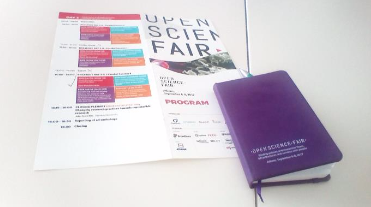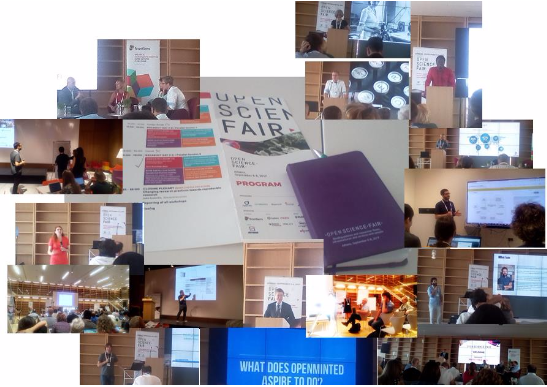1st OPEN SCIENCE FAIR Report, Athens, September 2017 (Closing Thoughts)
A reflective overview of plenaries and workshop sessions during the Open Science Fair 2017, by Sant-Geronikolou Stavroula. 6-8 September 2017
Celebrated at SNFCC National Library of Greece facilities, this highly inspirational and well organized conference attracted the attention of a vast audience from around the globe with participants’ specializations ranging from LIS and publishing to educational and IT fields engaged in vivid conversations where the question is not anymore whether or not adopting OA/OS principles but when and how to add extra dimensions to NGRs; a conference that judging from the variety of topics addressed, it has already set the standard and future directions of discussions to come. In the era of the 4th Science paradigm where collaboration is synonymous to participation, where open content, crowdsourcing, collaborative research and interactive participatory science dissemination are evolving from buzzwords to norms and dissemination has become just as important as publishing (Penev), librarians are put to the spotlight as torchbearers of the OA /OS movement especially in the data management and open data licensing cases as there is a growing demand for repositioning the institution and libraries at the fore front of providing access to research through a community managed infrastructure where they will be the foundational nodes in a global scholarly communication system (Kathleen Shearer).
“The mantra of publish or perish is dead” Jon Tennant
In times where bold new visions for the modern research library are been articulated across the globe in terms of knowledge creation, dissemination and preservation, experts and community input on how Academic librarians can be leaders in supporting interactive, contextualized, participatory, comprehensive access to knowledge and to the products of the full cycle of research (MIT Future of Libraries Report 2017) becomes even more crucial. As creation and access to knowledge turn dynamically networked, and “OA wins all of the arguments all of the time” (Ogunlaja, Open Access Nigeria) librarians have to be prepared to effectively address a set of related issues and transform their libraries to open platforms for global research and learning that encourage open dissemination. To that end,
“… we need a broad coalition that buy in to the vision we are proposing”
Kathleen Shearer, COAR Executive Director
OSFair presented a unique opportunity to extend baseline knowledge of OA /OS emerging platforms and tools use cases acquired during LIBER Summer 2017 Conference and NDC topic specific presentations and webinars last spring to a more insightful perspective of current and future challenges and benefits that librarians and researchers should and are already beginning to grow an appreciation for as they come to more deeply comprehend how and why OA is essential to the scientist–society contract in terms of reproducibility, accountability, innovation and science democratization (Ioannidis).
A series of recurring themes emerging from workshops and presentations in relation to research community OS shared visions and mutually identified challenges provided us with an initial conceptual framework that every academic librarian should definitely become aware of in order to effectively support the institution and researchers achieve their full potential within this emerging ecosystem.
“The Era of Big Data begs for collaboration” Jeffrey D. Sachs
Overall, it has been an extremely advantageous opportunity for both my identities, that of information professional and doctoral student involved in data–intensive research, to holistically consider through concrete evidence the OA /OS paradigm -from strengths and infrastructural/ attitudinal challenges to visions and future priorities- that helped rotate my standpoint and shape a strong positive GO OpenScience- oriented mindset.
“We had to get out-of-the-box to see how OA relates to the community” Natalia Manola, Athena Research and Innovation Center
Key Takeaways
- There is already a lot of consolidation around these issues [Shearer]
- There is an avant-garde of researchers using innovative dissemination channels with great success marking a European predominance [Kraker]
- There is a shift of focus or emphasis towards OS evaluation models, namely open peer review, OS impact metrics
- As OS /OA gain momentum and OS platforms flourish, we are urged to respond to a new set of questions critical to researchers and OS supporters’ engagement and participation.
- Bridging knowledge with open source semantic text mining infrastructure is important to overcome silos and information fragmentation
- Open and sustainable TDM platforms can facilitate the leap from OA to OS
- Interoperability is a growing demand [Knoth]
- Changing practices for science methods, results and inferences reproducibility are underway.
|
RAPPORTEUR: |
Photo Credit: Stavroula Sant-Geronikolou |
This report was originally posted on Zanodo. View original report.
Related Articles
- https://www.openuphub.eu/community/blog/item/1st-open-science-fair-report-athens-september-2017
- https://www.openuphub.eu/community/blog/item/join-us-for-the-open-science-fair-2017
- https://www.openuphub.eu/community/blog/item/open-science-fair-2017





